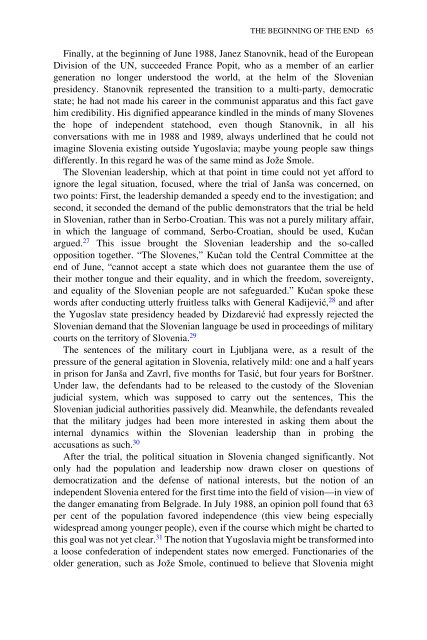Yugoslavia: A History of its Demise - Indymedia
Yugoslavia: A History of its Demise - Indymedia
Yugoslavia: A History of its Demise - Indymedia
You also want an ePaper? Increase the reach of your titles
YUMPU automatically turns print PDFs into web optimized ePapers that Google loves.
THE BEGINNING OF THE END 65<br />
Finally, at the beginning <strong>of</strong> June 1988, Janez Stanovnik, head <strong>of</strong> the European<br />
Division <strong>of</strong> the UN, succeeded France Popit, who as a member <strong>of</strong> an earlier<br />
generation no longer understood the world, at the helm <strong>of</strong> the Slovenian<br />
presidency. Stanovnik represented the transition to a multi-party, democratic<br />
state; he had not made his career in the communist apparatus and this fact gave<br />
him credibility. His dignified appearance kindled in the minds <strong>of</strong> many Slovenes<br />
the hope <strong>of</strong> independent statehood, even though Stanovnik, in all his<br />
conversations with me in 1988 and 1989, always underlined that he could not<br />
imagine Slovenia existing outside <strong>Yugoslavia</strong>; maybe young people saw things<br />
differently. In this regard he was <strong>of</strong> the same mind as Jože Smole.<br />
The Slovenian leadership, which at that point in time could not yet afford to<br />
ignore the legal situation, focused, where the trial <strong>of</strong> Janša was concerned, on<br />
two points: First, the leadership demanded a speedy end to the investigation; and<br />
second, it seconded the demand <strong>of</strong> the public demonstrators that the trial be held<br />
in Slovenian, rather than in Serbo-Croatian. This was not a purely military affair,<br />
in which the language <strong>of</strong> command, Serbo-Croatian, should be used, Kučan<br />
argued. 27 This issue brought the Slovenian leadership and the so-called<br />
opposition together. “The Slovenes,” Kučan told the Central Committee at the<br />
end <strong>of</strong> June, “cannot accept a state which does not guarantee them the use <strong>of</strong><br />
their mother tongue and their equality, and in which the freedom, sovereignty,<br />
and equality <strong>of</strong> the Slovenian people are not safeguarded.” Kučan spoke these<br />
words after conducting utterly fruitless talks with General Kadijević, 28 and after<br />
the Yugoslav state presidency headed by Dizdarević had expressly rejected the<br />
Slovenian demand that the Slovenian language be used in proceedings <strong>of</strong> military<br />
courts on the territory <strong>of</strong> Slovenia. 29<br />
The sentences <strong>of</strong> the military court in Ljubljana were, as a result <strong>of</strong> the<br />
pressure <strong>of</strong> the general agitation in Slovenia, relatively mild: one and a half years<br />
in prison for Janša and Zavrl, five months for Tasić, but four years for Borštner.<br />
Under law, the defendants had to be released to the custody <strong>of</strong> the Slovenian<br />
judicial system, which was supposed to carry out the sentences, This the<br />
Slovenian judicial authorities passively did. Meanwhile, the defendants revealed<br />
that the military judges had been more interested in asking them about the<br />
internal dynamics within the Slovenian leadership than in probing the<br />
accusations as such. 30<br />
After the trial, the political situation in Slovenia changed significantly. Not<br />
only had the population and leadership now drawn closer on questions <strong>of</strong><br />
democratization and the defense <strong>of</strong> national interests, but the notion <strong>of</strong> an<br />
independent Slovenia entered for the first time into the field <strong>of</strong> vision—in view <strong>of</strong><br />
the danger emanating from Belgrade. In July 1988, an opinion poll found that 63<br />
per cent <strong>of</strong> the population favored independence (this view being especially<br />
widespread among younger people), even if the course which might be charted to<br />
this goal was not yet clear. 31 The notion that <strong>Yugoslavia</strong> might be transformed into<br />
a loose confederation <strong>of</strong> independent states now emerged. Functionaries <strong>of</strong> the<br />
older generation, such as Jože Smole, continued to believe that Slovenia might
















